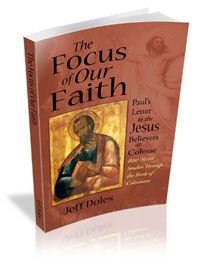… if indeed you continue in the faith, grounded and steadfast, and are not moved away from the hope of the gospel which you heard, which was preached to every creature under heaven, of which I, Paul, became a minister. (Colossians 1:23)
It is the Father’s good will to reconcile all things in heaven and earth through the Son, by the shedding of His blood on the cross. This is the good news of the gospel. We participate in this reconciliation by believing the gospel of Jesus the Messiah. This was the good news the believers at Colosse first heard from Epaphras, who learned it from Paul. This gospel, then, was the one Paul himself ministered and which had gone out into all the world.
“If indeed you continue in the faith.” They had already begun in the faith and were “grounded and steadfast” in it (Paul gave thanks for that earlier). The Greek words picture a building properly settled on a good foundation. Paul does not want them to be “moved away” or shifted off the foundation that has been laid for them, the “hope of the gospel.” Hope is not about uncertainty but expectation. Their expectation was seated on a good foundation, the gospel, which Paul was always zealous to protect.According to the grace of God which was given to me, as a wise master builder I have laid the foundation, and another builds on it. But let each one take heed how he builds on it. For no other foundation can anyone lay than that which is laid, which is Jesus Christ. Now if anyone builds on this foundation with gold, silver, precious stones, wood, hay, straw, each one’s work will become clear; for the Day will declare it, because it will be revealed by fire; and the fire will test each one’s work, of what sort it is. (1 Corinthians 3:10-13)Now Paul wants them to continue in the faith in which they began, and indeed, he is confident that they will. That is exactly why he writes. He sees false teaching coming in on them and he wants to preempt it and prevent it from gaining any foothold, so that they remain firm in their faith in Jesus and the wonderful expectation that comes from the gospel.
Now, therefore, you are no longer strangers and foreigners, but fellow citizens with the saints and members of the household of God, having been built on the foundation of the apostles and prophets, Jesus Christ Himself being the chief cornerstone, in whom the whole building, being fitted together, grows into a holy temple in the Lord, in whom you also are being built together for a dwelling place of God in the Spirit. (Ephesians 2:19-22)The good news of Jesus the Messiah is the reconciliation of heaven and earth, and the foundation of every good expectation for those who continue in their faith in Him.

The Focus of Our Faith
Paul’s Letters to the Jesus Believers at Colosse
Bite-Size Studies Through Colossians
by Jeff Doles
Preview with Amazon’s “Look Inside.”
Available in paperback and Kindle (Amazon), epub (Google and iTunes) and PDF.





















